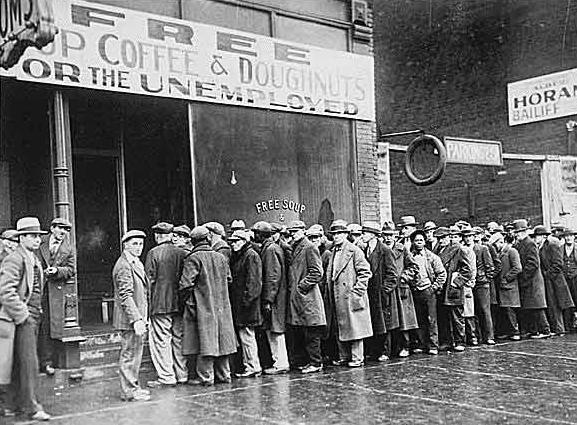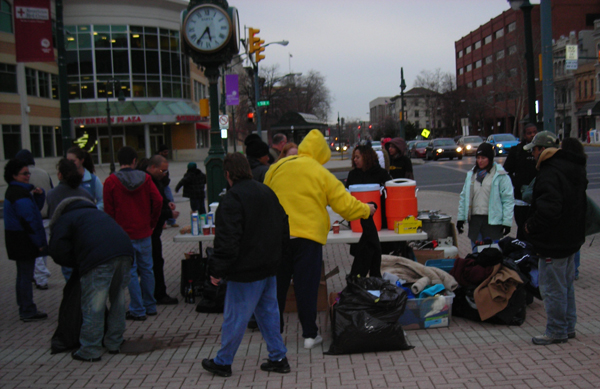Priorities
So now they're acknowledging there's a jobs problem but it's only in public sector jobs?
Seems to me everybody from Obama to Reid to Boehner to Pelosi to McConnell to Cantor are already making sure their public sector jobs take priority.
I went to a local job fair yesterday. Fifty people applied for a single part time convenience store clerk job.
Really wish I had time to rant and write more but I am desperately trying to find one of those private sector jobs where things are "just fine".
The Hill:
Reid says government jobs must take priority over private-sector jobs
By Pete Kasperowicz
Senate Majority Leader Harry Reid (D-Nev.) on Wednesday said Congress needs to worry about government jobs more than private-sector jobs, and that this is why Senate Democrats are pushing a bill aimed at shoring up teachers and first-responders.
"It's very clear that private-sector jobs have been doing just fine; it's the public-sector jobs where we've lost huge numbers, and that's what this legislation is all about," Reid said on the Senate floor.
Reid was responding to recent comments from Senate Minority Leader Mitch McConnell (R-Ky.), who accused Democrats of purposefully pursuing higher taxes as part of the teacher/first-responder bill, S. 1723, so that Republicans would oppose it. McConnell said the bill was meant to fail in order to give Democrats an issue to run on in the 2012 election, but Reid said the Republicans are simply trying to defeat President Obama any way they can.
The legislation Reid is defending is part of Obama's jobs package. Vice President Biden was in Pennsylvania, an important election state, on Tuesday to push for the administration's plan on increasing the number of teachers.
Reid reiterated his emphasis on creating government jobs by saying Democrats are looking to "put hundreds of thousands of people back to work teaching children, have more police patrolling our streets, firefighters fighting our fires, doing the rescue work that they do so well … that's our priority." He said Republicans are calling the bill a "failure" because they are "using a different benchmark for success than we are."
Private-sector jobs have increased over the last 19 months, while government jobs have lagged. They've also seen cuts in several states that are struggling to balanced their books.
Reid also said a majority of people polled support the bill, and that the tax hike needed to fund the $35 billion spending program is minimal.
"My friend, the Republican leader … is complaining about a tax of one-half of 1 percent … on people who make more than $1 million a year to pay for a program that would stop teachers from being laid off and rehire some of the teachers that have been laid off," Reid said.
Democrats who support the bill have said it would help save 400,000 teacher jobs and thousands of first-responder jobs that have either been cut or could soon be cut. Reid said Wednesday that these layoffs are "rooted in the last administration," but did not explain further.
Senate Democrats are hoping to pass S. 1723 as early as this week, although votes could be delayed until early November, depending on the progress made on passing a 2012 spending bill.
Reid also dismissed efforts by the Republican House to ease environmental regulations as a way to create jobs.
"The Republican response has been cutting back environmental health safeguards, I guess hoping that a sicker, more polluted country is a better place to create jobs, and it's not," Reid said.
Bloomberg:
Top Income in U.S. Is...Gasp!...Wash. D.C. Area
By Frank Bass and Timothy R. Homan
Federal employees whose compensation averages more than $126,000 and the nation’s greatest concentration of lawyers helped Washington edge out San Jose as the wealthiest U.S. metropolitan area, government data show.
The U.S. capital has swapped top spots with Silicon Valley, according to recent Census Bureau figures, with the typical household in the Washington metro area earning $84,523 last year. The national median income for 2010 was $50,046.
The figures demonstrate how the nation’s political and financial classes are prospering as the economy struggles with unemployment above 9 percent and thousands of Americans protest in the streets against income disparity, said Kevin Zeese, director of Prosperity Agenda, a Baltimore-based advocacy group trying to narrow the divide between rich and poor.
“There’s a gap that’s isolating Washington from the reality of the rest of the country,” Zeese said. “They just get more and more out of touch.”
Total compensation for federal workers, including health care and other benefits, last year averaged $126,369, compared with $122,697 in 2009, according to Bloomberg News calculations of Commerce Department data. There were 170,467 federal employees in the District of Columbia as of June. The Washington area includes the District of Columbia, parts of Northern Virginia, eastern Maryland and eastern West Virginia.
Embracing K Street
In recent years Washington has attracted more lobbyists and firms with an interest in the health-care overhaul and financial regulations signed into law by President Barack Obama, according to local business leaders.
“Wall Street has moved to K Street,” said Barbara Lang, president and chief executive officer of the DC Chamber of Commerce, referring to the Washington street that’s home to prominent lobbying firms. “Those two industries clearly have grown in our city.”
Still, household income fell even in Washington by 0.8 percent last year from $85,168. In the San Jose area, home to Cupertino-based Apple Inc. (AAPL) and Cisco Systems In
c. (CSCO) in San Jose, income dropped to $83,944 from $84,483 in 2009.
Median income in both metro areas has been falling since 2008, when it reached a record in each place. The 4.7 percent drop in Silicon Valley during that period was three times larger than the Washington region’s 1.5 percent fall.
‘Shallower Recession’
The flow of federal dollars in and around the nation’s capital helped the region weather the economic slump better than most areas and is contributing to its recovery.
The unemployment rate in the Washington metro area in August was 6.1 percent, compared with 10 percent in San Jose, according to Labor Department figures. Nationally, joblessness was 9.1 percent in September for a third straight month.
“The region did experience a shorter, shallower recession than San Jose,” said Sara Kline, a Washington analyst at Moody’s Analytics Inc. in West Chester, Penn
sylvania. “The federal government stepped in to take efforts to dampen the recession. It was focused to some extent in the D.C. area as well, given the presence of federal workers there and contractors. That insulated it from more of a downturn.”
Federal government spending for programs excluding Social Security and Medicare in fiscal year 2011, which ended on Sept. 30, rose to $2.38 trillion from $2.3 trillion the previous year.
Lawyer Capital
Last year Washington also had the most lawyers per capita in the U.S. compared with the 50 states, with one for every 12 city residents, according to figures from the A
merican Bar Association and the Census Bureau. In New York State the figure was one out of every 123 residents, while in California the ratio was one in 243.
Associate attorneys in the Washington area who have worked between o
ne and eight years had a median salary of $186,250, compared with the national median for their peers of $123,521, according to a survey by the Washington-based National Association for Law Placement.
Lobbyists play a prominent role in the Washington economy. In 2010 there were 12,964 registered lobbyists, with most working in or around the nation’s capital, accor
ding to figurescompiled by the Center for Responsive Politics, a Washington-based research group that tracks political spending. Spending on lobbying efforts reached a record $3.51 billion last year, up from $3.49 billion in 2009.
Contractor Central
The Washington suburbs are also home to government contractors such as Bethesda, Maryland-based Lockheed Martin Corp. (LMT), the world’s largest defense company, and General Dynamics Corp. (GD), the Falls Church, Virginia-based maker of Abrams tanks and Gulfstream business jets.
With about 5.6 million residents, the Washington region has an aggreg
ate household income of about $221.4 billion. The San Jose area has about 1.8 million people and income of $67 billion, according to census figures gathered from the American Community Survey. The annual survey polls about 3 million American households to provide annual economic, demographic, social and housing characteristics for the nation.
The Brownsville-Harlingen metro area in southeast Texasalong the border with Mexico had the lowest median household income last year at $31,736.
Such income inequality is on display in Washington as well. In the District of Columbia, almost 11 percent of the city’s population qualifies as “very poor,” meaning they make less than half the poverty rate, or about $11,025 a year for a family of four and $5,415 for a s
ingle person. The same figure for San Jose is about 6 percent, according to census figures.
“Even though we’ve got this very healthy group of government employees and contractors, there’s still a lot of people left behind,” said Douglas Besharov, a professor at the University of Maryland’s School of Public Policy.

Soup kitchen in Reading last Spring.
It hasn't gotten any better around here.



- Al Sharpton Says Republicans Are To Blame For High Black And Hispanic Unemployment
Surprise: What he says makes absolutely no sense whatsoever. First he says we have gained jobs in the public sector. That's false. During Obama's term, the private sector has lost tens of millions of jobs. Second, he says the public sector has...
-
Washington Examiner: 95% blacks say Feds should provide jobs Providing an 11th hour clue to how blacks will vote on the presidential stage, 95 percent of African Americans believe that the federal government should be the nation's jobs creator,...
-
The Hill: The Hill Poll: Voters say US is in decline By Mike Lillis - 10/24/11 05:00 AM ET More than two-thirds of voters say the United States is declining, and a clear majority think the next generation will be worse off than this one, according to...
- Delusion Alerts…
“It’s very clear that private-sector jobs have been doing just fine,” Reid said on the floor of the Senate on Wednesday, as he pushed for a Democratic plan to spend another $35 billion to support states in hiring teachers and first responders. “It’s...
-
Infuriating. Barack Obama introduced his jobs proposal on September 8th. Knowing there was no chance -- NONE -- that it would pass The House and just about as good a chance it would pass The Senate. Still he spent a month pushing it, demanding it be approved...

